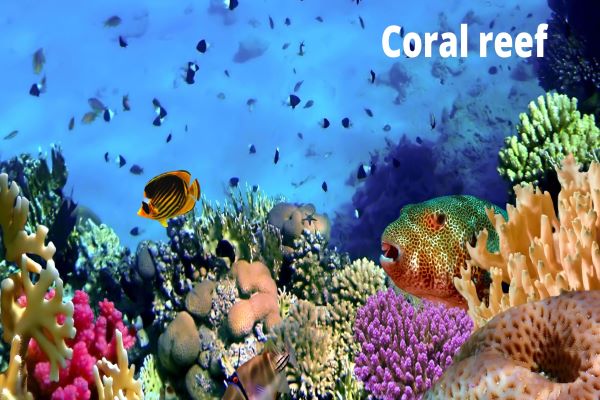
Coral reefs are one of the most beautiful and diverse ecosystems on Earth. But they’re in danger. Oxybenzone, an example of a common ingredient in sunscreen, is damaging coral reef habitats around the world. Luckily, there are many coral reef safe sunscreens available that don’t contain reef-damaging ingredients such as oxybenzone and octinoxate.
Read on to learn more about the damaging effects of two ingredients, oxybenzone and octinoxate on coral reefs, and find out which reef-safe sunscreens are best for acne-prone skin.
What Are Coral Reefs and What is Oxybenzone’s Effect on Them?
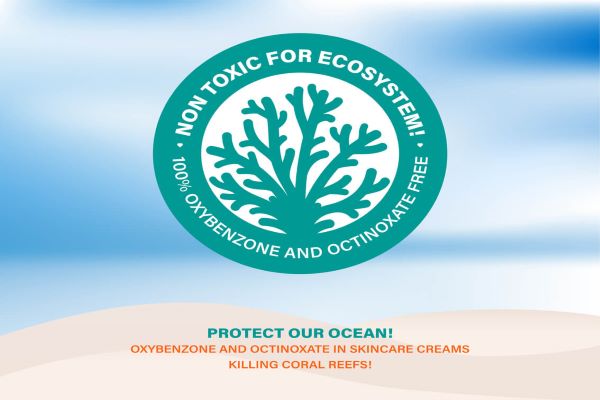
Coral reef is an underwater ecosystem that typically thrives in tropical or subtropical waters. These reefs are extremely important to marine life and serve as homes and breeding grounds for many different species of fish, invertebrates, and other marine life. Coral reef ecosystems are also a major source of food and income for humans, as they provide us with fisheries, tourism, and coastal protection.
Coral reefs are a critical part of our ecosystem, and they’re under threat from a variety of sources including climate change and pollution. One particular source of pollution that is often overlooked is sunscreens. Sunscreens with oxybenzone and octinoxate are damaging to coral reef ecosystems, and it’s important that we be aware of this and switch to reef-safe sunscreens.
Oxybenzone is a chemical that is found in many sunscreens. It’s responsible for the UV protection that sunscreen provides, but it also has a negative effect on coral reef ecosystems. When oxybenzone comes into contact with coral, it causes the coral to bleach. This can kill the coral or stunt its growth, and it can have a ripple effect throughout the reef ecosystem.
Octinoxate is another chemical found in sunscreen that is damaging to coral reef ecosystems. Octinoxate works similarly to oxybenzone, causing coral bleaching and reef death.
How to Find Coral Reef Safe Sunscreens
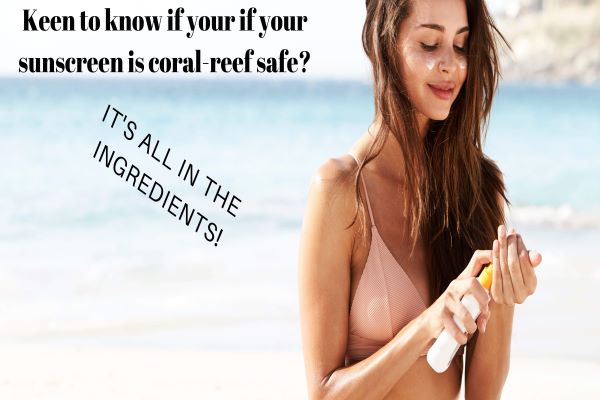
With the damaging effects of oxybenzone on coral reefs, many people are now looking for reef-safe sunscreens. There are many reef-safe sunscreens available on the market, and it’s important to know how to find them.
When looking for reef-safe sunscreens, the important ingredients to look for are oxybenzone and octinoxate. Avoid any sunscreens that contain these ingredients or chemicals, as they can be harmful to coral reef ecosystems.
To reflect and scatter ultraviolet radiation, chemical-free sunscreens rely on physical blockers such as zinc oxide and titanium dioxide. These minerals are considered safer for the environment and your health than chemical sunscreens, which can be irritating to the skin.
There are many reef-safe sunscreens available that don’t contain oxybenzone and octinoxate, so you have plenty of options to choose from.
As an amazon associate, I earn from qualifying purchases. Full disclosure…
The Best Coral Reef Safe Sunscreens for Acne-Prone Skin: 10 Alternatives
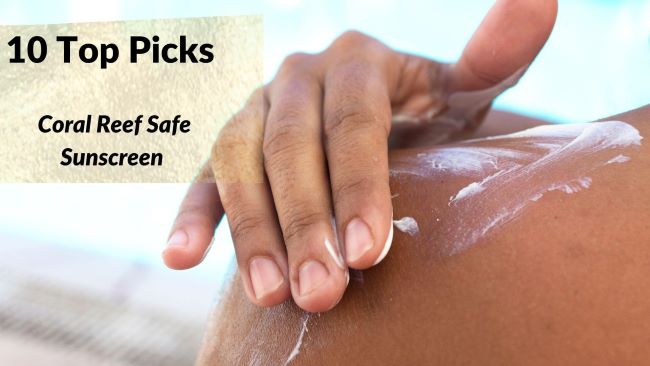
Acne is a common skin condition that can be both painful and embarrassing. For many people, the thought of wearing sunscreen is enough to make them break out in a sweat. But with the damaging effects of oxybenzone and octinoxate on coral reefs, it’s important to find a reef-safe sunscreen that won’t aggravate your acne.
There are many reef-safe sunscreens on the market that are specifically designed for acne-prone skin. These sunscreens typically contain zinc oxide or titanium dioxide, which provide excellent sun protection without causing breakouts.
Below are 10 of the best reef-safe sunscreens for acne-prone skin include:
#1: EltaMD UV Clear Broad-Spectrum SPF 46
EltaMD UV Clear Broad-Spectrum SPF 46 is reef-safe and ideal for acne-prone skin, as it contains zinc oxide to protect against UVA and UVB rays without causing breakouts.
#2: TruSkin Mineral Face Sunscreen SPF 30
TruSkin Mineral Face Sunscreen SPF 30 is another reef-safe sunscreen that’s ideal for acne-prone skin. It contains zinc oxide to provide broad-spectrum sun protection without causing breakouts.
#3: Bare Republic Mineral Sport Sunscreen Lotion SPF 50
Bare Republic Mineral Sport Sunscreen Lotion SPF 50 reef-safe sunscreen is ideal for people who are active, as it contains zinc oxide to provide broad-spectrum sun protection. It’s also water-resistant for up to 80 minutes.
#4: La Roche-Posay Anthelios Melt-In Milk Sunscreen SPF 60
La Roche-Posay Anthelios Melt-In Milk Sunscreen SPF 60 is ideal for people with sensitive skin, and won’t cause breakouts, as it’s both reef-safe and hypoallergenic. It contains zinc oxide to provide broad-spectrum sun protection.
#5: Aveeno Positively Mineral Sensitive Skin Daily Sunscreen SPF 50
Aveeno Positively Mineral Sensitive Skin Daily Sunscreen SPF 50 is reef-safe and ideal for people with sensitive skin. It contains zinc oxide to provide broad-spectrum sun protection, and it’s also hypoallergenic and non-comedogenic.
#6: CeraVe Mineral Sunscreen SPF 50
CeraVe Mineral Sunscreen SPF 50 is a reef-safe sunscreen that contains zinc oxide to provide broad-spectrum sun protection. It’s also non-comedogenic and won’t clog pores.
#7: Neutrogena Clear Face Liquid Lotion Sunscreen SPF 30
Neutrogena Clear Face Liquid Lotion Sunscreen SPF 30 sunscreen is specifically designed for acne-prone skin. It contains zinc oxide to provide broad-spectrum sun protection, and it’s also oil-free and non-comedogenic.
#8: Blue Lizard Australian Sunscreen, Sensitive SPF 30+
Blue Lizard Australian Sunscreen, Sensitive SPF 30+ sunscreen is reef-safe and ideal for people with sensitive skin. It contains zinc oxide to provide broad-spectrum sun protection.
#9: Supergoop! Unseen Sunscreen SPF 40
Supergoop! Unseen Sunscreen SPF 40 is a reef-safe sunscreen that contains zinc oxide to provide broad-spectrum sun protection. It’s also oil-free and non-comedogenic, making it ideal for acne-prone skin.
There are other advantages of supergoop! Unseen Sunscreen such as being makeup friendly.
#10: CeraVe Sunscreen Face Lotion SPF 30
CereVe Sunscreen Face Lotion SPF 30 is reef-safe sunscreen that contains zinc oxide to provide broad-spectrum sun protection. It’s also non-comedogenic and contains ceramides to help restore the skin’s natural barrier.
When shopping for reef-safe sunscreens, be sure to look for ones that contain zinc oxide or titanium dioxide. These ingredients provide excellent sun protection without causing breakouts.
With so many reef-safe sunscreens on the market, there’s no excuse not to switch to a reef-safe sunscreen if you’re concerned about the damaging effects of oxybenzone and octinoxate on coral reefs. And be sure to choose a sunscreen that’s specifically designed for acne-prone skin to ensure the best results.
Why it is Important to Use Reef Safe Sunscreens
Coral reef ecosystems are being damaged by the ingredients in many sunscreens. Oxybenzone, in particular, is very harmful to coral and can cause bleaching and death. Octinoxate is also another harmful ingredient with similar effects as Oxybenzone.
Reef-safe sunscreens do not contain oxybenzone or any other harmful ingredients that can damage coral. By using reef-safe sunscreen, you can help protect these beautiful ecosystems from harm.
In addition to helping protect coral reefs, reef-safe sunscreens also provide excellent sun protection. They typically contain zinc oxide or titanium dioxide, which are both effective ingredients for blocking the sun’s harmful rays.
So are you looking for a sunscreen that’s good for the environment and your acne-prone skin? Be sure to choose one that’s reef-safe and won’t clog your pores.
Conclusion: Why Not Choose A Coral Reef Safe Sunscreen Today!
Coral reef ecosystems are being damaged by the ingredients in many sunscreens. Oxybenzone and octinoxate are harmful to coral and can cause bleaching and death.
Reef-safe sunscreens do not contain oxybenzone or any other harmful ingredients that can damage coral. By using reef-safe sunscreen, you can help protect these beautiful ecosystems from harm.
In addition to helping protect coral reefs, reef-safe sunscreens also provide excellent sun protection. They typically contain zinc oxide or titanium dioxide, which are both effective ingredients for blocking the sun’s harmful rays.
So if you’re looking for a sunscreen that’s good for the environment and your skin, be sure to choose one that’s reef-safe.
FAQs
1) What makes coral reef sunscreen suitable for acne prone skin?
Coral reef sunscreen is a mineral-based sunscreen that works by reflecting UV rays away from the skin instead of absorbing them, like chemical-based sunscreens. This helps to prevent breakouts related to traditional sunscreens, as the minerals are less likely to clog pores.
2) Is coral reef sunscreen effective at protecting skin against UV rays?
Yes, coral reef sunscreen is just as effective at blocking UVA and UVB rays as traditional chemical-based sunscreens, even though the active ingredients are different. It provides broad spectrum protection against both types of harmful UV radiation.
3) How much coral reef sunscreen should I use?
A good rule of thumb is to apply two milligrams per square centimeter of exposed skin area. This is about one and a half teaspoons of sunscreen you apply. Make sure to cover all exposed areas including your face, neck, and ears. Don’t forget to reapply after swimming or perspiring heavily for maximum protection throughout the day.
4) When is the best time to apply coral reef sunscreen?
You should apply your coral reef sunscreen 15–30 minutes before you go out in the sun so it has time to absorb into your skin and become fully effective in blocking out harmful UV rays. It’s also important to remember to re-apply every two hours (or more often if you’ve been swimming or sweating).
5) How long does coral reef sunscreen last on my skin?
Generally speaking, coral reef sunscreen remains active on your skin for up to 2 hours before needing reapplication. Depending on how much you sweat or swim during that period of time, you may need to reapply more frequently than every two hours for optimal protection from UV rays.
Are you passionate about prioritizing your acne-prone sunscreen to coral reef safe? Share with us how you feel about any experience you have relating to this topic in the comment section below.
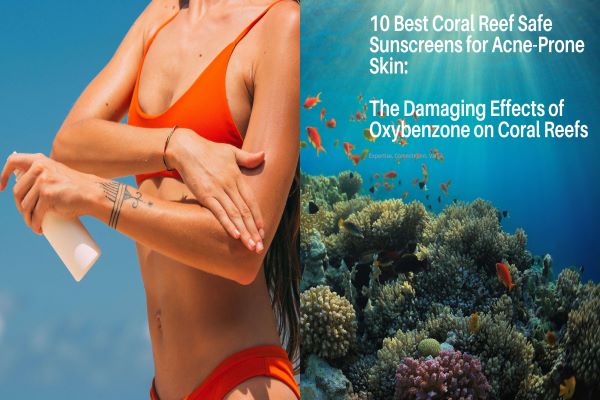
Your article on the damaging effects of oxybenzone on coral reefs and the best reef-safe sunscreens is incredibly informative. It’s eye-opening to learn about the impact of certain sunscreen ingredients on marine life. Have you encountered any personal experiences or stories about how these chemicals affect ecosystems firsthand? Additionally, your recommendations for reef-safe sunscreens catered to acne-prone skin are valuable. Have you personally tried any of these products? I’ve been on the lookout for a reef-safe sunscreen that’s gentle on the skin but still effective against acne.
I appreciate your emphasis on educating consumers about making more eco-conscious choices when it comes to skincare. It’s essential to strike a balance between protecting our skin and preserving the environment. How do you think we can further spread awareness about the harmful effects of certain sunscreen ingredients and encourage the use of reef-safe alternatives? Your article is a great step in this direction, offering practical solutions for those concerned about both their skin and the planet. Thank you for sharing this crucial information!
I appreciate your feedback. I’m delighted to provide information that contributes to our environmental consciousness. I’ve personally used “Aveeno Positively Mineral Sensitive Skin Sunscreen,” as mentioned in the article. This sunscreen not only lacks oxybenzone and Octinoxate, which I refer to as coral reef-harming ingredients, but it is mineral-based and also sweat- and water-resistant for up to 80 minutes. Additionally, it boasts an SPF of 50, providing protection against both UVA and UVB rays. It’s suitable for sensitive skin, acne, etc., as it is hypoallergenic, which makes it a great choice!
Also, you are welcome to ask further questions if you seek any more clarifications. Thanks
This was very insightful. I bookmarked the page so I can have another read of it. Thanks for spreading awareness or else people like me would not know anything about it. I’m about to tell people I know to stop that happening to the coral. Not fair on the fishes homes or sea in general.
Thank you for your kind words, Paraone! I’m glad you found the information insightful. It’s wonderful that you’re taking action by spreading awareness and encouraging others to protect the coral and the sea. Every small effort counts towards making a positive impact. If you have any questions or need more information, feel free to ask. Together, we can make a difference! Cheers 🙂
Such a complete article I loved it You even added the FAQs section at the end .That anticipates potential questions readers may have, offering concise answers and further enhancing the informative nature of the article. Overall, the piece encourages readers to make environmentally conscious choices without compromising their skincare needs. Thank you for sharing your knowledge with every body.
Thank you for your comment. Environmental awareness is a plus when looking at skincare products.